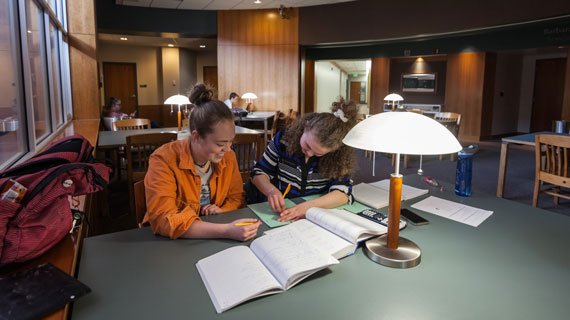Annotating a Text: How to Annotate Readings

Close reading a text is a great way to get the most out of an assigned reading. Annotating a text is an effective close-reading strategy that every college student should be able to do. Learning how to annotate a text is a great way to increase your retention of the information, prepare for class, and create easy-to-reference notes for studying and completing other assignments.
Annotation may seem overwhelming at first, but there is no need to fear! Annotating a text is personal to you and the task at hand. Creating annotations might look like highlighting sections of text or creating a guide with a key. What works for one person might not work for another, so try out multiple methods for annotation and find what works best for you.
How to Annotate Academic Resources
Annotating an Article
Professors across all content areas will assign academic, peer-reviewed articles throughout your degree program. These articles may appear dense at first, but they will become easier to read as you advance through your program and learn how to annotate them. One of the best ways to get more out of an academic article is to read them with a critical eye: ask questions and search for answers.
Here are a few more tips for annotating an article:
- Locate and highlight the thesis statement. Use the thesis statement to guide your reading as you ask questions and search for answers.
- Make note of pieces of text that either support or contradict the thesis. These notes can help you form an opinion and even an argument about the article, aiding with potential class discussions and writing assignments.
- Note any bias or statements that aren’t backed with research that you discover in the article.
- This is where your critical eye will come in handy as you read the article. Discovering bias or unbacked statements can also help you form an argument and can create great questions to ask your professor in class or during office hours.
- Write down your thoughts, reactions, questions, etc. in the margins as you read. Writing down these things can help you understand your process as a reader, the writer’s process, and the subject matter of the article. Additionally, your raw thoughts can create great topics for discussion and debate in class.
Annotating a Literary Text
The purpose of annotating a literary text, such as a novel or a short story, is often to note and gather relevant information for discussions and writing assignments. Allowing central themes and critical moments in the text to guide you as you annotate is a great way to get started.
Here are a few more tips for annotating a literary text:
- Make notes of your thoughts and reactions to the text in the margins. Noting your thoughts as you read can help you better understand the shape of the text overall upon later review.
- Highlight and/or underline specific lines and words that stand out to you. These lines might stand out to you because of the writing and language or because of the line’s contribution to the plot or a larger theme in the text. Highlighting such instances in the text is a great way to cite evidence in a discussion or a writing assignment.
- Mark moments in the text in which you see writing devices, figurative language, and other writing mechanics being employed. Often the technique used to write a text contributes to a larger theme or plot point.
- Write down questions in the margins of the text as you read. Your questions, general or existential, can help propel insightful discussions, generate content for writing assignments, and help you stand out in class.
Annotating a Textbook Chapter
The purpose of annotating a textbook chapter is usually to be able to quickly reference and/or find important information at a later time. Knowing what is important to highlight or underline is often the tricky part of annotating a textbook chapter because of the existing formatting.
Here are a few more tips for annotating a textbook chapter:
- Write down your questions as you go, either in the textbook or on a separate piece of paper.
- Asking questions as you go can help you read the text more closely and focus in on smaller details that will likely answer your questions. Additionally, the questions that don’t get answered in the reading would be a great thing to ask your professor about during office hours.
- Noting the headings and subheadings, especially in STEM textbooks, is a great way to read with more intention. Focus on the information promised in the headings as you read to make sure you are comprehending what you should.
- Highlight vocabulary words. If the vocabulary words aren’t defined in the textbook, define them in the margin. If you want to go the extra mile, make flashcards for the vocabulary words, noting the page number the words appear in the textbook. Studying goes beyond the assigned readings.
- Write down any connections you make between what you read in the textbook and what you cover in class and/or lab. Making these connections in the margins is a great way to cross-reference information when you go back to study for a quiz or test.
Get the most out of your degree by showing up and getting everything you can out of every class. Prepare for class by not only completing the readings, but by completing the readings with intent and purpose. Annotating a text, asking questions, and searching for answers are key to being a good student.
Campus resources for homework and academic help include the Tutoring Center, the Writing Center, and the Speech and Presentation Center.


